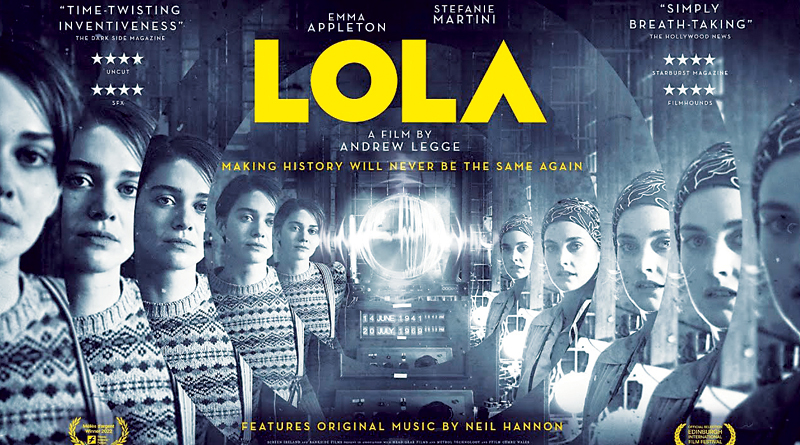“Lola” Is A Sci-Fi Treat ~ At The Movies With Kasey

Often, time travel stories focus on moving forward or backward in time to change the outcome, but what if all you needed was access to radio waves from the near future to completely change the course of history? In Lola, sisters Thomasina (Emma Appleton) and Martha (Stefani Martini) operate a machine that they named after their mother, Lola, which intercepts broadcast signals from the future, allowing them to enjoy the music of David Bowie in 1940 and, for example, predict German airstrikes, saving hundreds of lives. When the British military discovers their secret operation, they ask the sisters to assist with counter-intelligence, under the watchful eye of an officer, Sebastian (Rory Fleck Byrne). While Martha and Sebastian start a romance, Thomasina and Lola’s work for the war machine has dramatic side effects.
Lola was an absolute delight, an engaging blend of science fiction, comedy, romance, and drama. The chemistry between Emma Appleton and Stefani Martini carries their depiction of very close, brilliant sisters, but the story is also elevated by the creative use of archival footage, constructing a period piece convincingly out of old video, manipulated with new voiceovers that sound authentic. Anachronisms abound because of Martha’s curiosity about the art and music of the 1960s and 70s, but the best joke in that category comes when the movie produces fascist pop songs in the style of the early-70s.
Lola looks very arty, with elegant cinematography, but the story unpretentiously delivers a simple, straightforward tale of unintended consequences and sisterly loyalty. I really loved this one.
Lola was directed by Andrew Legge, who wrote the screenplay with Angeli Macfarlane. It runs for 79 minutes and is rated 18+. It is available to rent or buy on Amazon Prime.
A new miniseries on Netflix, Painkiller, tells the story of Purdue Pharmaceuticals’ role in the opioid epidemic. Narrated by Edie Flowers (Uzo Aduba), in a deposition against the Sackler family, the series weaves together her narrative of investigating the rise of OxyContin abuse with stories of drug sales reps, families impacted by opioids, and the Sackler family’s history.
Maybe the most effective choice Painkillers makes is to begin each episode with a disclaimer from a real person, explaining that although some elements of the series are fictionalized, their story is not. They hold a photo of their loved one who died because of opioids. These testimonies keep the rest of the series grounded in the emotional truth that Edie makes a point of repeating – opioids do not just destroy the lives of those addicted to them but also those of everyone in their orbit.
The stylistic choices of Painkiller can sometimes be a little corny, and the characters oversimplified, playing specific archetypes, but the show clearly and convincingly makes an argument. Unlike Hulu’s Dopesick, which focused primarily on the impact on rural communities, this series draws parallels between the opioid and crack epidemics, depicting how addiction creates chaos for all sorts of community institutions.
As Richard Sackler, Matthew Broderick slides into his niche of portraying odd, creepy businessmen. The portrayal of the Sacklers frames them as almost cartoonishly evil, and it is hard to tell if doing so was purposeful or the consequence of Broderick’s performance. Fortunately, most of the other actors give much more grounded performances. Taylor Kitsch, Carolina Bartczak, and Jack Mulhern stand out as a family whose home and business are torn apart after a workplace accident leads to OxyContin addiction. As sales rep Shannon Schaeffer, West Duchovny balances naivete with greed, providing a sympathetic foil to her over-the-top mentor, played by Dina Shihabi. As Edie, Uzo Aduba provides a steady, compelling voice of reason.
Painkiller follows the same narrative threads as Hulu’s Dopesick, with good doctors led astray, ambitious sales reps, families struggling with addiction and recovery, and the dishonest techniques Purdue Pharma used to flood the market with their drug. There are enough differences in style and substance to make both shows worth watching. It is tempting to ask how many books, shows, podcasts, etc. we need about the opioid epidemic, but as long as they hammer away at how malicious the actions of the Sackler family and Purdue Pharma were, I am okay with their proliferation. I worry that these narratives may exploit the pain of the families devastated by opioids, but productions like Painkiller and Dopesick seem to take their dignity seriously, saving contempt for the Sacklers.
Painkiller was created by Micah Fitzerman-Blue and Noah Harpster and directed by the talented Peter Berg. It runs for six episodes and is rated TV-MA. Some medical elements are really hard to watch.
- “Inside Out 2” Triumphs! : At The Movies With Kasey - July 19, 2024
- ‘Am I OK?’ Celebrates Late Blooming: At The Movies With Kasey - July 5, 2024
- ‘Hitman’ Is A Miss: At The Movies With Kasey - June 21, 2024


